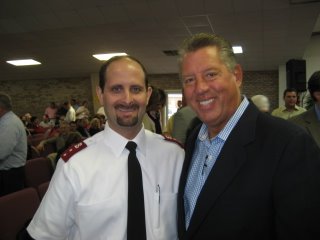“Be joyful always; pray continually; give thanks in all circumstances, for this is God’s will for you in Christ Jesus” (1 Thessalonians 5:16-18 NIV).
When I was a kid, I would always smash all my food together and eat it. Mom would make fried chicken, peas, corn, mashed potatoes, macaroni and cheese, and rice and gravy, and I’d swirl it all together, except for the chicken, and eat it like a hot, mushy salad.
Many of us are careful to keep our food separated, just like we compartmentalize our lives. We have our work life, family life, church life, and on and on. There are also occasions when we verbally and literally speak to God, connect with God, and invite God to join us, and there are occasions when we never even consider God as being a part.
For the Jews of all time, including today, prayer has always been the method used to remind them that everything in the world belongs to God and is for His purposes.
The Jews, including Jesus and Paul, have a prayer or a benediction for everything. These prayers or benedictions are called berakhot, translated in English as “blessings.” A blessing is a prayer of thanksgiving to God. It is not a prayer of power or effectiveness upon an item, situation, or place, but a prayer of thanks for the item, situation, or place. In other words, we don’t bless food; we bless God for the food.
The Jews pray a blessing for every part of life. There is nothing that is secular. All things are sacred, set apart for God, but not all people honor God in them. Think about music. All music belongs to God, but not all music is honoring to God. Still it belongs to Him. Whether it honors God or not is up to God’s people. That’s why it’s so important to pray a blessing to God for everything, reminding ourselves that God is always present and expecting to be honored.
The Jewish rabbis taught, “It is forbidden to a man to enjoy anything of this world without a benediction, and if anyone enjoys anything of this world without a benediction, he commits sacrilege” (Babylonian Talmud, Berakhot 35a). –Marvin Wilson, Our Father Abraham, page 157.
"Secular" did not exist in the Jewish mind, but in the Greek mind it infiltrated the theology of the church. Eusebius of Caesarea in the 4th century said, “There are two ways of life for those of us in the church. The one devotes itself to the service of god alone, while the other, more humble, more human, permits farming, trade, and other more secular interests. The first is the perfect form of the Christian life while the other represents a kind of secular grade of piety.”
Praying a blessing to God for everything is a good way to remember to give Him honor no matter what we are a part of. It’s much more difficult to do something that is sinful, when we remember that after we are finished enjoying it, we will be thanking God for providing whatever “it” is.
There is an ancient rabbinic story called “The Rabbi and the Exceedingly Ugly Man” that reminds us that everything is God’s.
“On one occasion Rabbi Eleazer son of Rabbi Simeon was coming from Midgal Gedor, from the house of his teacher. He was riding leisurely on his donkey by the riverside and was feeling happy and elated because he had studied much Torah. There he chanced to meet an exceedingly ugly man who greeted him, ‘Peace be upon you, rabbi.’ He, however, did not return his greeting but instead said to him, ‘Raca [‘Empty one’ or ‘Good for nothing’] how ugly you are! Is everyone in your town as ugly as you are?’ The man replied; “I do not know, but go and tell the craftsman who made me, ‘How ugly is the vessel which you have made.’ When R. Eleazer realized that he had sinned he dismounted from the donkey and prostrated himself before the man and said to him, ‘I submit myself to you, forgive me!’” –Brad H. Young, The Parables, page 9.
Giving thanks in all circumstances, good, bad, beautiful, and ugly, helps us to keep all things in perspective…God’s perspective.
Forever learning,
Johnny





